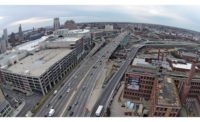The removal and replacement of several Massachusetts Turnpike bridges is the kind of project that could easily take years to complete. But the Massachusetts Dept. of Transportation plans to dramatically speed up the process by replacing eight Turnpike bridges during eight weekends in a $60-million-plus project the agency has dubbed the “Acceler-8,” project.
The bridges are all located along the Turnpike in Westborough and Southborough approaching Interstate-90’s busy intersection with I-495, due for a $400-million makeover next year.
Now 60 years old, the bridges are all in serious need of repair. With MassDOT gearing up to undertake the revamp of the I-90 and I-495 intersection, the agency wanted the bridge replacement project done first to limit disruption to traffic and commuters, says District 3 Highway Director Barry Lorion.
The first bridge will be replaced the weekend of June 18, with the project slated for completion the week of Aug. 16.
“They are all in significant need of repair – it made more sense to replace them,” he says. Typically, a project like this could take three or four years to do, he adds.
But state transportation officials have opted to use accelerated bridge replacement techniques crafted in prior projects to replace the eight spans over the Turnpike.
In order to replace a bridge over the course of a single weekend, the concrete pieces are precast in factories and then assembled on site. That eliminates the need to pour the concrete into molds on the site itself, a significantly longer process, Lorion says.
In order to close the gaps between the pieces, the construction team will pour fast-curing concrete, which will be ready to go – and roll over – in four to six hours, according to Jean-Pierre Telemaque, the project's chief engineer at MassDOT
Two years of planning and design work have also been crucial in teeing up the bridge replacement project.
A zipper barrier machine will reroute traffic, shifting traffic to one side of the highway and narrowing down the lanes to two in each direction.
Innovative Acceleration
MassDOT said the agency pioneered its accelerated bridge construction tactics back in 2011, when it replaced 14 bridges on I-93 over ten weekends that summer. The agency refers to that project—which was highlighted by the Federal Highway Administration as an example of innovative work—as the “Fast 14.”
Still, replacing bridges rapidly can actually cost more, at least upfront, roughly 20% more than traditional methods, Lorion says.
But that has to be weighed against the much lower level of disruption to traffic and the lives of commuters that is a key part of rapid bridge replacement.
The stretch of Turnpike is a particularly busy one, with 100,000 cars and trucks a day driving over it. In addition, the contractor is on the hook for any overruns with the design-build contract, he says.
“There is a risk premium here,” Lorion says. “On the MassDOT side, our exposure is limited.”
JF White is the contractor on the job, while Tetra Tech is the engineer.
MassDot selected the project team last year, citing their previous experience working on rapid bridge replacement projects as a plus.
“The design-build team assembled for this project has a lot of experience with Fast 14 and the Commonwealth Bridge replacement,” Lorion says. “They have worked with MassDot in the past and that gave MassDOT a lot of confidence this was the right team to do the job with.”





Post a comment to this article
Report Abusive Comment